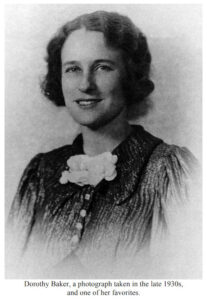 A wet purse was discovered at the seaside in January of 1954. The woman who had been carrying the bag was on a flight from Rome to London. Two days earlier, the jet had crashed into the water, killing every person on board. There was a booklet about the Bahá’i Faith inside the purse. A fellow traveller, gave her the leaflet just before they were both fatally injured. Consequently, Dorothy Baker continued to spread Baha’u’llah’s Healing Message till the very end of her life. She passed away at the age of 55 while sharing the Faith and traveling to meet her husband at their international pioneering post, her wish to “die in her runners” was realized.
A wet purse was discovered at the seaside in January of 1954. The woman who had been carrying the bag was on a flight from Rome to London. Two days earlier, the jet had crashed into the water, killing every person on board. There was a booklet about the Bahá’i Faith inside the purse. A fellow traveller, gave her the leaflet just before they were both fatally injured. Consequently, Dorothy Baker continued to spread Baha’u’llah’s Healing Message till the very end of her life. She passed away at the age of 55 while sharing the Faith and traveling to meet her husband at their international pioneering post, her wish to “die in her runners” was realized.
Dorothy Baker was a well-known Bahá’i and notable American educator. She advanced to leadership roles in a Local Spiritual Assembly before being chosen to serve a total of sixteen years on the National Spiritual Assembly of the faith. During World War II Dorothy became a member of the National Spiritual Assembly’s Racial Unity Committee and the movement to spread the faith throughout Central and South America. She received recognition for her years of service in December 1951 when Shoghi Effendi, the then-head of the Bahá’i faith, promoted her to the position of those referred to as Hands of the Cause of God. The primary duty of those in this status, was to spread and safeguard the Bahá’i Faith.
Born Dorothy Beecher, December 21, 1898, she was distantly related to Uncle Tom’s Cabin author and American abolitionist Harriet Beecher Stowe. When Dorothy was 13 years old, her Bahá’i grandmother, who was a practicing member of the faith, introduced her to it. ʻAbdu’l-Bahá, the head of the Faith at the time, was visiting the West for a lengthy period of time when her grandmother brought her to New York City to see him. About two years later around the time of her 15th birthday, Dorothy took steps to formally become a Bahá’i.
A few years later in 1921 after graduating from college she married Frank Baker, a widower with two children, and took his surname. In 1922, they had a daughter, one year later their son was born. For the next several years Dorothy spend her time raising the children and continuing her career as a teacher.
When Dorothy attended the annual national Baha’i convention in 1929, she did so with a heavy heart because she thought she only had a few months to live owing to a spot on her lung and the lump in her breast. She was asked if she was “ready to depart this life without performing some major contribution to the Cause” by a friend who was aware of her physical and emotional state. Dorothy later that day described herself as a “spiritual criminal.” As she “lived uncommitted.” Later still, Dorothy would sit in prayer at the spot where ʻAbdu’l-Bahá had set the cornerstone of the Mother Temple of West, located in Wilmette, Illinois. She prayed with so much passion she wrote these thoughts: “The few minutes at the shrine will never be forgotten. How my throat ached. What those moments taught me cannot be put into words. I think my heart was laid at the Master’s (ʻAbdu’l-Bahá) feet there.”
Dorothy’s intense study of the Writings and her long periods of prayer were the cornerstones of her change from “living uncommitted” to “distinguished Hand of the Cause,” from a “gnat” to a “eagle.” She would leave her children to go to school while she was encircled by the Writings she was studying, and they would come home to find her in the same position after a long day of learning. This would go on for days, weeks, and even months.
One Baha’i friend has placed on record the intensity of the experience of praying with Dorothy. As Dorothy was driving with Javidukt Khadem, Dorothy asked her to join her in reciting the Remover of Difficulties 95 times for a potential pioneer. Javidukt recounts:
She said it very slowly, and with each word the tears poured down. She didn’t even notice me. I looked at her. I had never experienced anything like this. The tears covered her face, and dropped onto her clothes. I did not even count the number of prayers she said, but when she finished she pulled the car over to the side of the road, and she passed out…After about 10 minutes she opened her eyes, and was so happy!… I asked her, “Is this the way you always pray?” She answered, “Is there any other way?
The major print biography of Dorothy Baker’s life was written by her granddaughter, Dorothy Freeman, and researched by her daughter, Louise Baker Mathias — Mathias, Louise B., ed. (1999) [1984]. From Copper to Gold: The Life of Dorothy Baker. Baháʼí Publishing Trust, USA. p. 320. ISBN 0853981779.




